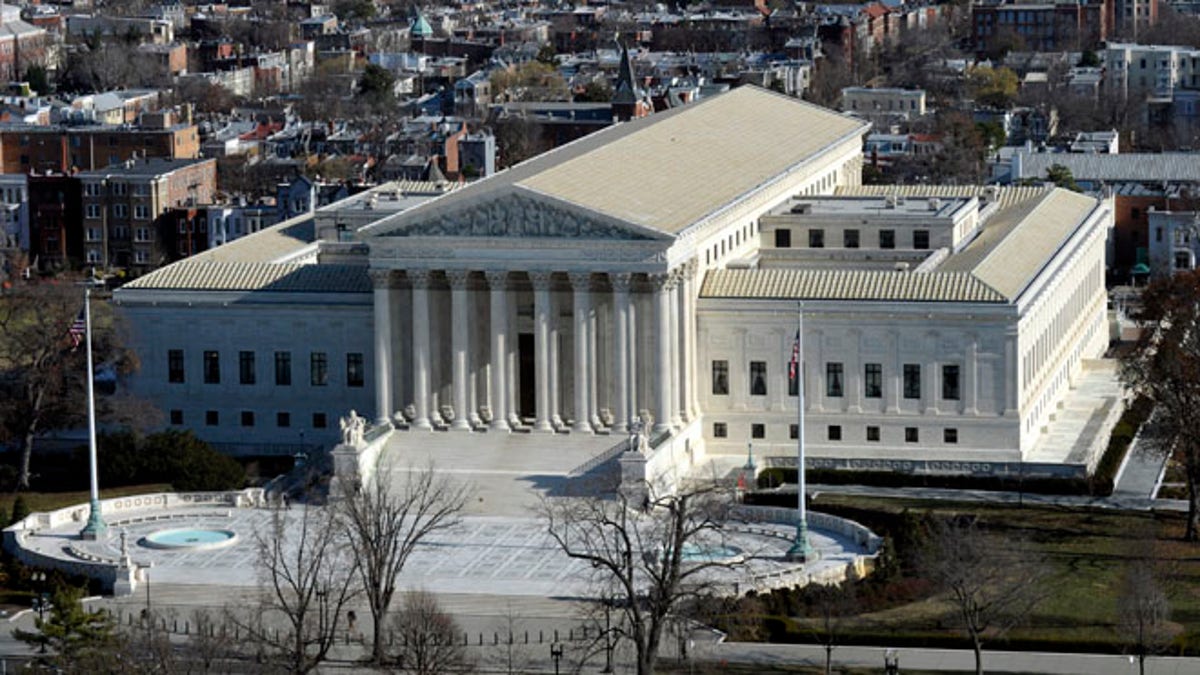
Dec. 19, 2013: A view of the Supreme Court from near the top of the Capitol Dome on Capitol Hill. (AP)
The Supreme Court on Tuesday weighed what one justice described as a "radical" change in the way labor unions force workers to pay them.
Though the case has flown somewhat under the radar, the arguments before the high court underscored the potential impact of the dispute. The justices posed tough questions to both sides, without giving a clear indication as to which way they might rule. But they repeatedly stressed that a ruling against the unions here would be significant.
"You're essentially destroying not just the ... shop, but you're destroying the ability of the union to get money even from the people who don't agree with what it's doing," Justice Antonin Scalia told the plaintiff's attorney.
At issue are the complaints of home health care workers in Illinois, who object to having to pay "fair share fees" to compensate the union for its work. The workers say the fees violate the First Amendment by compelling them to associate with the union.
Though lower courts have thrown out the lawsuit, if the Supreme Court agrees it could undermine the ability of unions in several states -- not just Illinois -- to collect fees from home care workers. That would, then, chip away at union budgets and membership in the public sector.
In Illinois, those workers are classified as state employees because their salaries come from Medicaid.
Paul Smith, who represented the state, argued that the union fees are being spent on a variety of services, including negotiating contracts, operating a call center and maintaining a "grievance system."
But William Messenger, representing the workers, said the "compulsory" fee system "violates the First Amendment."
The justices at times took a skeptical tone toward Messenger's argument. Justice Elena Kagan called the argument "radical" and said it would "radically restructure the way workplaces across this country are run."
"You're asking us to overturn a case that's been the law for 35 years," Justice Stephen Breyer said.
But the justices were by turns skeptical toward Smith's argument as well.
Justice Anthony Kennedy, a key swing vote on the bench, repeatedly made sympathetic statements regarding the workers' position.
"I'm talking about whether or not a union can take money from an employee who objects to the union's position on fundamental political grounds," Kennedy told Smith, adding: "I'm asking the justification for that under the First Amendment."
Kennedy said that "in an era where government is getting bigger and bigger ... this is becoming more and more of an important issue to more people."
Kennedy later said, bluntly: "So your position is that the public employees must surrender a substantial amount of First Amendment rights to work for the government?"
Smith answered: "When there are substantial interests of the government as employer that are served by the sacrifice."
The hearing also was marked by a sharp exchange between Justice Sonia Sotomayor and Scalia.
Sotomayor asked where the First Amendment violation was, noting the workers "can speak however they want in support of or in opposition to absolutely anything the union is doing."
Scalia interjected: "I suppose the fact that you're entitled to speak against abortion would not justify the government in requiring you to give money to Planned Parenthood?"
Messenger replied, "Exactly, your honor."
The Associated Press contributed to this report.




